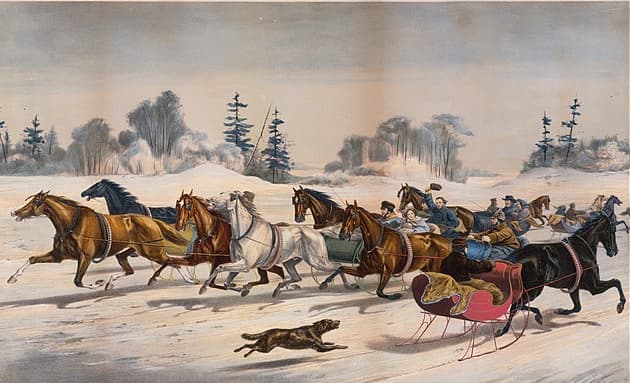Poem of the Day: ‘Thanksgiving Day’
Lydia Maria Child was among the busybodiest of all the busybodies the world has ever known, yet she crafted the best-known Thanksgiving verses in the canon of American poetry.

There’s a certain annoying type of 19th-century New England woman: a collection of the busybodiest of all the busybodies the world has ever known. And Lydia Maria Child (1802–1880) must surely rank among their exemplars. Counting herself a friend of the activist Margaret Fuller (and that in itself is a telling little mark), Child marched through life as a writer, speaker, and complainer, never happy unless she had an evil to fight, a downtrodden population to exhort to greater effort, and a straw man to set on rhetorical fire. The fact that she was often right in her causes — especially abolition — seems almost incidental: a byproduct of her utter conviction of her own correctness, her do-gooderism, and her Puritan inheritance as one of the elect, the most righteous people in the world. Her railings against the entire discipline of theology, for example, are almost too good to be missed. Almost.
But Child also wrote — and allow her the credit she deserves — the best-known Thanksgiving verses in the canon of American poetry: “Over the river and through the wood, / To grandfather’s house we go.” Published in 1844, the poem is about children in a sleigh, heading to Child’s grandparents’ farm near Medford, Massachusetts: “Now grandmother’s cap I spy! / Hurrah for the fun! Is the pudding done? / Hurrah for the pumpkin-pie!” Set to a melody from an unknown source shortly after its appearance, the lyrics (usually shortened to four stanzas, and sometimes strangely converted to a Christmas song) quickly became an American standard. (Here, for example, is a 2019 rendition by the Mormon Tabernacle Choir.) And why not give Lydia Maria Child at least one cheer for that inexplicably charming lapse?
The New-England Boy’s Song about Thanksgiving Day
by Lydia Maria Child
Over the river and through the wood,
to Grandfather’s house we go;
the horse knows the way to carry the sleigh
through the white and drifted snow.
Over the river and through the wood,
to Grandfather’s house away!
We would not stop for doll or top,
for ’tis Thanksgiving Day.
Over the river and through the wood —
oh, how the wind does blow!
It stings the toes and bites the nose,
as over the ground we go.
Over the river and through the wood,
with a clear blue winter sky.
The dogs do bark and the children hark,
as we go jingling by.
Over the river and through the wood,
to have a first-rate play.
Hear the bells ring, “Ting-a-ling ding!”
Hurray for Thanksgiving Day!
Over the river and through the wood—
no matter for winds that blow;
or if we get the sleigh upset
into a bank of snow.
Over the river and through the wood,
to see little John and Ann.
We will kiss them all, and play snowball
and stay as long as we can.
Over the river and through the wood,
trot fast my dapple gray!
Spring over the ground like a hunting-hound!
For ’tis Thanksgiving Day.
Over the river and through the wood
and straight through the barnyard gate.
We seem to go extremely slow —
it is so hard to wait!
Over the river and through the wood —
Old Jowler hears our bells;
he shakes his paw with a loud bow-wow,
and thus the news he tells.
Over the river and through the wood —
when Grandmother sees us come,
she will say, “Oh, dear, the children are here,
bring pie for everyone.”
Over the river and through the wood —
now Grandmother’s cap I spy!
Hurrah for the fun! Is the pudding done?
Hurrah for the pumpkin pie!
___________________________________________
With “Poem of the Day,” The New York Sun offers a daily portion of verse selected by Joseph Bottum with the help of the North Carolina poet Sally Thomas, the Sun’s associate poetry editor. Tied to the day, or the season, or just individual taste, the poems will be typically drawn from the lesser-known portion of the history of English verse. In the coming months we will be reaching out to contemporary poets for examples of current, primarily formalist work, to show that poetry can still serve as a delight to the ear, an instruction to the mind, and a tonic for the soul.
